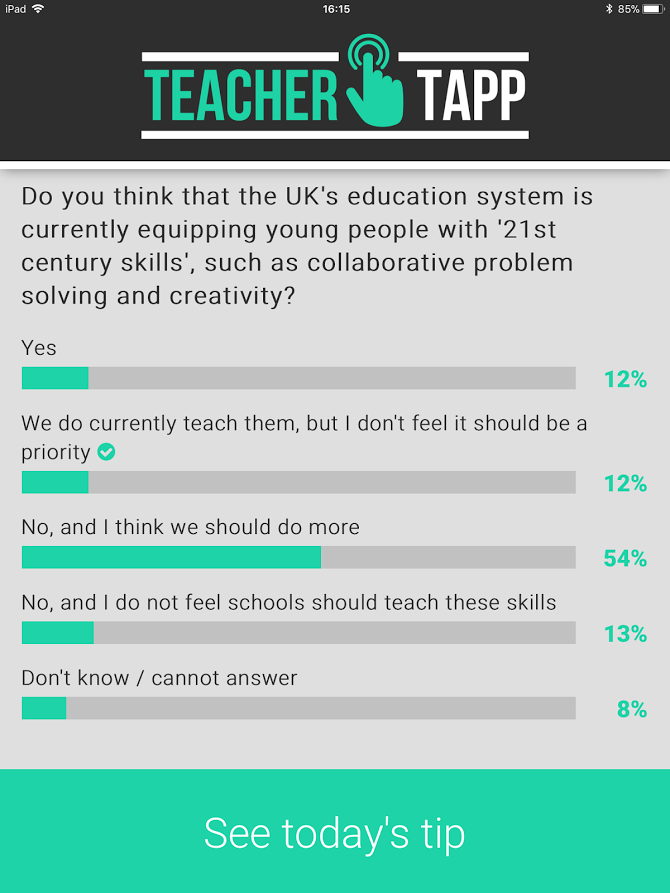
Gazing into the future

It would appear that 54% of people in education believe that:
- there are such things as “21st century skills”,
- that these skills include “collaborative problem solving” and “creativity”,
- schools aren’t currently teaching them,
- we should teach them.
I think this is problematic.
21st Century skills
The idea that there are such things as uniquely “21st century skills” is picked apart beautifully in Daisy Christodoulou’s book Seven myths about education. One issue with the idea is that the 21st century is going to be so vastly different from the 20th that we need to teach a whole new set of skills whilst at the same time being so similar that we can project what these skills will be.
Often tied up in the idea of “21st century skills” is the that of preparing for jobs of the future. This however assumes that;
- We can predict what the jobs of the future will want. If we accept the premise that things are moving so quickly the future will look drastically different from the past it seems unlikely that we can teach the specific skills these future employees will need.
- Jobs of the future will want something different to jobs in the past. A lot of time and energy has been spent looking at future trends in employment. This article in The Guardian suggests that the jobs that are most secure from future automation are those require human relationships combined with a great deal of very specific knowledge. Not a lot of generic soft skills.
- Education is about preparing pupils for work. I don’t think that education should be about nothing more than creating future economic units. I think that an excellent education in and of itself should be a right for every child.
21st Century skills include collaborative problem solving and creativity.
The examples of 21st century skills given in the survey were those of collaborative problem solving and creativity. Try as I might I can’t picture another century that didn’t need people working together to solve problems. In many ways, it is this capacity for working in teams to overcome problems in our environment that makes us human.
Daisy Christodoulou writes,
It is quite patronising to suggest that no one before the year 2000 ever needed to think critically, solve problems, communicate, collaborate, create, innovate…. It is probably true that in the future more and more people will need these skills, and that there will be fewer economic opportunities for people who do not have these skills. But that would suggest to me that we need to make sure that everyone gets the education that was in the past reserved for the elite. That is not redefining education for the twenty-first century; it is giving everyone the chance to get a traditional education.
Christodoulou, D (2014) Seven myths about education.
Schools don’t teach these skills but they should
Apparently, schools don’t teach creativity, we kill it. One piece of evidence given by the likes of Ken Robinson to support this idea is that young children, before they enter the dream-crushing factory of schools, are able to come up with hundreds of ideas for how to use a simple paperclip. Adults, who have passed through the school system however, come up with far fewer.
I would argue that what is happening here isn’t the crushing of creativity but the addition of knowledge. As people get more knowledgeable they are better able to evaluate their ideas and sift out the ones that won’t work. Looking at the quantity of ideas for the use of a paperclip tells you nothing about creativity but the quality of the ideas might.
If we want pupils to be good at problem solving we need to give them a lot of knowledge with which to solve problems. There is no generic problem solving short cut we can use. The problem solving skills of “I need to put up a bookcase but have lost the instructions” is very different from the problem solving skills of “We need to resolve the conflict in the Middle East.” I we spent less time trying to find these short cuts we might have a lot fewer wonky bookcases and a little more chance of peace.
I can’t speak for all subjects and contexts but in secondary school geography we are constantly problem solving. It is what Geographers do but each problem needs a wide body of very specific knowledge. We look at how they would solve the problem of the UK’s energy mix, how they would improve housing in informal settlements and yes, even how to solve the problems in the Middle East (if someone without a knowledge of catchment hydrology tries to pontificate on the issue I wouldn’t give them the time of day).
The same applies to “creativity”. The ability to create is an important and wonderful thing. Music, art and drama should play a full and important part in the curriculum but they aren’t about teaching something as generic as “creativity”. They are about teaching the skills to allow you to be creative in that particular domain. Learning to express your creativity in art is unlikely to help you pick up the trombone and learning how to write is unlikely to make your interpretive dance any less awkward.
If you think that these things can be taught as stand alone generic skills (I assume you there is a 54% chance you are) then please do send me a lesson plan because I would love to see how it is done.
Conclusion
I think the term “21st century skills” is a nonsense. The generic skills that people will need in this century will be the same as they have needed in all of them because they are the things that make us human. I don’t think they can be taught in isolation. I don’t think we get better at “problem solving” by solving problems in different domains or better at “creativity” in one domain by practicing another.
Schools play a role in preparing children for the future and that role is to ensure they leave us as knowledgeable and well informed adults.



“If we spent less time trying to find these short cuts we might have a lot fewer wonky bookcases and a little more chance of peace.”
Absolutely brilliant. Great post.
LikeLiked by 1 person
Thank you 😎
LikeLike
Perhaps you should do an internet search to find the myriad lesson plans designed to teach problem solving and creativity and critica thinking. What is required is a different way of approaching school and learning-you can google that also. School should never be about filling kids up with useless redundant facts and knowledge, but rather about empowering them to become lifelong learners – this is the 21st century after all!
LikeLike
I can’t find any lessons that teach generic “creativity” or problem-solving. They rely on pupils having been taught specific skills to allow them to be creative and having the knowledge with which to solve problems. If you can actually find one that you think does this then please do share.
Can you give an example of facts which are taught that are redundant?
LikeLike
I love the “you can google that also.” I have to wonder if Mr. Corbett is aware of the irony in that.
LikeLiked by 1 person
At first I assumed he was joking but I think he was serious.
LikeLike
Look up the OCR TARS course (Thinking and Reasoning Skills). It is being discontinued so get in there quick – there is some brilliant material on there for teaching critical thinking skills, or critical thinking “know how” if you insist ☺️
LikeLiked by 1 person
Thanks James. Will see if I can get hold of it.
LikeLike
Pingback: The problem with 21st century problems — Teaching it Real – CLW Academy Educational Blog
Hello Mark,
Thanks so much for this piece – really interesting and made me think critically about my own practice/that of the organisation I work for.
As an organisation, we advocate the explicit teaching of eight ‘skills’ including some of those referenced in the piece, from EYFS to post-16. I think the word ‘skills’ is used as a cover-all but for us, is really a shorthand for sets of behaviours and strategies for each of those eight areas, as you allude too.Over the past few months, we have been looking at more explicitly embedding some of the principles which have recently been more commonly associated with a traditional knowledge mastery in our teacher training and resources: planning for direct instruction followed by deliberate practice, for example. It is a work in progress but so far, has been really invigorating and prompted a lot of reflection. Would be happy to share but as might not be the stand-alone skill resource you are looking for, as a lot of it does obviously ask young people to draw on their existing knowledge and ideas, to help them in developing the skills.
I am glad that 54% of teachers remain open to the ideas of developing skills in the classroom (putting the 21st century bit to a side), because I do think it can sit alongside a knowledge-rich, stretching curriculum: complementing, not competing. Think this is particularly important in contexts where access to extra-curricular and social opportunities are limited, to support in achievement of the same egalitarian ends, but so many ‘soft skills’ programmes have historically been built on flimsy, unresearched pedagogical approaches.
This was quite a lot longer than intended…thanks for the post!
LikeLiked by 1 person
Reblogged this on The Echo Chamber.
LikeLiked by 1 person
100% agree. We need more knowledge/content/facts taught in schools. Creative thought is knowledge dependant.
LikeLiked by 2 people
I had a copy of ‘Unearthed Arcana’ with that cover back in the 80s… I reckon a lot of my teaching skills and creative curriculum ideas come from being a DM for years….
LikeLiked by 1 person
I keep meaning to write a post on how D&D made me a better teacher.
LikeLike
Still got some of my old hand-written dungeons – narrative, structure, tension, and of course a killer map drawn with Rotring pens on technical graph paper…
LikeLiked by 1 person
Sounds like we need to team up on this blog post! And to play a kickass game of D&D of course 🤓
LikeLike